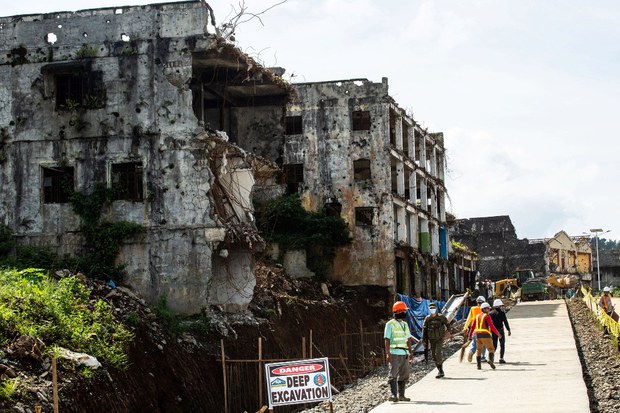Displaced Marawi Residents Accuse Philippine Govt of ‘Land Grabbing’
2021.07.09
Cotabato, Philippines
 Workers walk along a newly paved road and past buildings in Marawi destroyed in 2017 when Islamic State-inspired Muslim militants laid siege to the city in the southern Philippines, May 23, 2021.
Workers walk along a newly paved road and past buildings in Marawi destroyed in 2017 when Islamic State-inspired Muslim militants laid siege to the city in the southern Philippines, May 23, 2021.
Residents of Marawi, who saw their city destroyed four years ago during a battle to kick out militants linked to Islamic State extremists, accused the Philippine government on Friday of taking their properties during a slow rebuilding process.
Ibrahim Mimbalawag, one of the lawyers representing about 11,000 people who remain displaced, said that the government’s rehabilitation team had bulldozed parts of the city previously identified as being owned by his clients.
“That’s land grabbing. It’s private land and we have titles and documents. There was no consultation made,” Mimbalawag said.
The lawyer said he was among those who had seen their land taken over by the government.
“Recently, I tried to pay my property tax but they won’t accept my payment since our land was covered by the rehabilitation,” he said.
Housing Secretary Eduardo del Rosario, who chairs the Task Force Bangon Marawi, which oversees the city’s rehabilitation and reconstruction, responded on Friday to the lawyer’s allegations.
“If you mean well as an alleged Maranao leader, be part of the solution and not be part of the problem by spreading unfounded and deceitful public statements. Instead, let us unite for Marawi to rise as a prosperous and peaceful city again,” del Rosario said in a statement.
Hundreds of pro-Islamic State (IS) militants, led by Abu Sayyaf member Isnilon Hapilon, took over the lakeshore city starting in May 2017. During the siege, which was broken by government forces in October 2017, the militants beheaded Christians and held dozens of civilian hostages before government troops defeated them. The city was heavily bombed by the military.
President Rodrigo Duterte imposed martial law in the entire south, after the battle broke out on May 23, 2017. He allowed martial law to remain in force until December 2019, so that the military could prevent militants from regrouping and carrying out fresh attacks.
Despite the declaration, violence has persisted in the southern Philippines with deadly attacks carried out by IS-linked militants, including suicide bombings.
Hardest hit villages
Manila has so far spent about 17.5 billion pesos (U.S. $350 million) to rebuild Marawi, mostly for showpiece public facilities such as markets, government halls, schools, a museum and a central park.
The site being rebuilt covers four villages hardest hit by gunbattles in 2017 in a 40-acre area, in what used to be Marawi’s commercial district. It has remained off limits to the public since the siege ended. Much of the property is covered with overgrowth, according to International Alert, a London-based NGO that specializes in the prevention and resolution of conflicts worldwide.
“Everything that is happening there is an insult to the people,” said Saripada Pacasum Jr. of the Marawi Reconstruction Conflict Watch, which tracks the rehabilitation’s progress. “It affects the majority. We feel the pain of the people that’s why we are doing this.”
Jalilah Sapiin, another volunteer with the group, said restricting people from returning home was a social time bomb that could lead to conflict.
“It’s not the solution to the problem. Obviously what they are doing is wrong. We have titles obtained from our forefathers,” she said.







